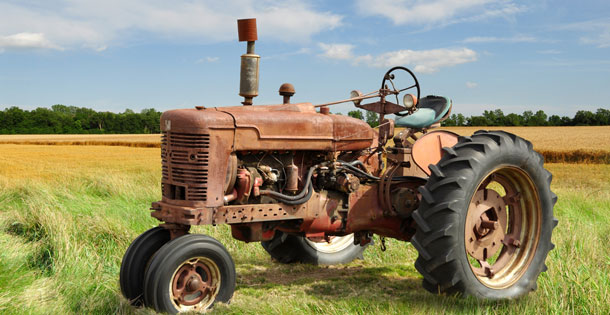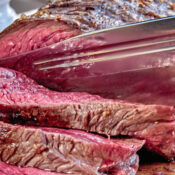Dunby lived in a trailer on a hill in the Yorkshire moors, in the north of England. At the time of this story, he was about 70, and his trailer had no electricity or running water. He listened constantly to the BBC on his battery-operated radio. As a result, Dunby could talk informatively about world events and faraway cultures.
Dunby survived by hiring himself and his old Fordson tractor out to local farmers who occasionally needed help hauling or plowing or with any other task on their land. He kept his tractor in perfect running order. He sometimes used it for transportation, especially to and from the village pub, the Robin Goodfellow, so he wouldn’t have to trudge the long uphill mile back home after an evening of swallowing pints of beer.
One autumn night, after discussing at length the Indian caste system with William Drenston — a sheep farmer whom he sometimes worked for — he swayed out of the pub to his tractor, started it, turned on the headlights, and lurched toward home.
It was the constable who found Dunby an hour later, sitting on the side of the lane. Dunby and his tractor had shot through an aged rock wall and down an embankment. Dunby was uninjured, but he’d left a four-foot-wide gap in the wall.
The constable cited Dunby for property damage and “being in charge of a piece of agricultural mechanism while inebriated.”
II
“Looks like you’ve had it, Dunby,” Drenston remarked the next evening in the pub. He’d just read the citation Dunby had slid across the small oaken table to him.
Dunby was pulling at his fluffy gray beard. “Had it? It’s not as though I’m a common criminal!”
Drenston took a swallow of beer and leaned forward. “Word is old Judge Blottleson’s never touched a drop in his life and is none too lenient when it comes to alcoholic offenses. He’ll revoke your operator’s license, that’s for sure. That won’t exactly invigorate your livelihood.”
The farmer reclined and put a hand to his nose. “And I doubt he’ll be impressed with your … lifestyle,” he remarked, scanning Dunby’s earthy presence.
Dunby gave Drenston a sharp look, then daydreamed into the fire for some moments.
Then, as if coming out of a dream, Dunby slowly uttered, “He’ll revoke my license, you say?”
“There’s little doubt in my mind.”
“Care to wager on that possibility, William?”
Drenston laughed. “I don’t want to take your money away.”
“I’ve put a little by over the years,” Dunby reassured him. “What would you say to five pounds?”
Other countrymen were overhearing and began to saunter over in ones and twos. It sounded a sure thing to them, and Dunby was soon surrounded by 15 or 20 men, each wagering five pounds that Dunby’s operator’s license would be withdrawn by Judge Blottleson.
III
The good Dunby’s summons date was 10 days later. He immediately began serving the 30 days which Judge Blottleson sentenced him to in lieu of a fine plus damages, which Dunby was disinclined or unable to pay. But the status of his operator’s license was unknown to the betting men of the Robin Goodfellow until Dunby walked in one chilly evening a month later.
The regulars looked at him curiously as he shut the door. They didn’t recognize him. He was clean-shaven and his straggly gray locks were trimmed and combed. He had on clean corduroy trousers and a wool sweater and a spotless pair of boots — all new, by the looks of them.
He walked over to Drenston’s table and sat down. Drenston stood up. “By God, it’s Dunby!” he cried hoarsely through a haze of cigar smoke.
Everyone was temporarily frozen. Suddenly, all the drinking and betting men carried their pints over and surrounded Dunby and welcomed him back.
“Look at you!” Drenston cried. “You’re ruddy well transformed!”
Dunby smiled. “It’s amazing what a month’s worth of regular bathing and a shave and a trim will do for you.”
The men laughed, and some slapped Dunby on the back. But they were waiting in suspense to hear of Judge Blottleson’s decision against him.
“You were right about the old judge, William,” Dunby said. “He was none too lenient.”
“I should say not, my friend — 30 days in gaol!”
Dunby was still smiling, but said nothing.
Drenston cleared his throat. “I assume,” he went on, “seeing as you had to serve time and all, that the judge did away with your operator’s license.”
The countrymen, gripping their pints, were silent. It seemed they all bent forward a hair. Even the barman, who had been wiping down the counter, paused and waited, cloth in hand. For a moment, the only sound in the pub was the popping of the fire in the antique, hallowed grate.
“Operator’s license?” inquired Dunby. He smoothed down his sweater and trousers and shuffled his feet in his bright boots. “Whoever told you gentlemen I had an operator’s license?” Dunby gazed puzzlingly at the circle of faces surrounding him. “Well? Come along, lads! How do you think I intended to pay for my new outfit?”
Become a Saturday Evening Post member and enjoy unlimited access. Subscribe now



